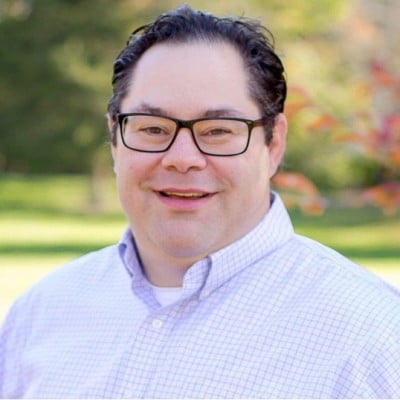Lee Davis has seen a thing or two happen in sports radio in his time. Davis, who currently serves as Audacy’s Senior Vice President, Sports Monetization, was almost there from the beginning of the format. Davis spent 15 years at legendary New York sports station WFAN from 1990-2005, joining just a few years after the station and format launched.
“I started [at WFAN] in 1990. So, the station had a little momentum. And then, the station just took off. It was a phenomenal product. And it was an incredible run to see that and the legacy that that station brought.
As for the format itself, Davis said, “It was a slow build. And then you just saw Philadelphia come into it and in Chicago. And at that point, you saw some network, ESPN get into it. And I just had a feeling that this was going to be an explosion because of everything that sports radio brings, whether it’s that one-on-one connection, the passion for the product, the personalities, all of those things made it really special. The fact that you could at the same time be talking to somebody who is driving a cab to the CEO who’s in the back of the cab going to a big meeting. The common denominator was sports and still is sports through all of the different demographics. People love it.”
After more than 30 years in the business and spending his first five years with Audacy running their Traffic, Weather, Information, News (TWIN), Davis was named to his current position in June 2023.
When asked to describe the position, Davis said, “We have several different roles here at the company that fall under the umbrella of the sports monetization team. And when I think about what our key objectives are at Audacy, we’ve taken the approach that since sports is local and we’ve got the best local sports radio stations in the country, how do we protect that and still have the opportunity to offer scale to our advertisers.
Davis said a big part of his position is taking ideas from one market or station and seeing how that could be done in other markets, regionally or nationally. The company oversees the Infinity Sports Network, the BetQL Network and has 40 all-sports radio stations and affiliates.
Davis explained, “How do we take all of this great content that we have and find best practices that we can share among each other? How do we unify our approach? How do we take some things that we might be doing in a market and scale it into other markets? Or conversely, can we generate ideas that are uniform enough that we can run them through all of our markets and still keep a local flavor to it? Those are some of our responsibilities. And we also work very closely, on a daily basis with our sports betting partners ensuring their success s they utilize our brands. So really with regards to all things sports, we are the thread between the entire company.”
Davis is charged with bringing all of the sports minds in the company together and talking through successes and things they may all be working on or trying to improve upon.
“We’ve got great sales leads in our markets overseeing our sports brands,” Davis said. “And what I do is make sure that we’re all talking what we’re doing in our markets or how are we overcoming challenges. Or is there a target that we want to go after either on a national or a network piece of business? How are we continuing to have those conversations and make sure that we’re spreading our knowledge throughout all of our markets and not staying in silos?”
When talking about the state of sports content and monetization, Davis pointed to the recent media rights conversations around professional and college sports, the amount of money being put into sports facilities and the amount of conversation people have that involves their teams. Davis believes sports talk radio is a big factor in all of it.
“I think sports is on quite a roll,” Davis said. “It’s really incredible. I was thinking about this the other day. I could make the argument that sports talk radio has been the fuel behind the economic growth of sports in all aspects. Because you think about when sports radio started back in 1987 on WFAN, when you think about where the sports ecosystem is now versus where it was then, what’s the difference? And really, there’s 24/7 sports talk now in every single market. And that has fueled interest in sports, where a game might be three hours, but for radio stations, we spend 21 hours talking about the game that just happened or the game that’s coming up. So, the promotional value that we give to sports and sports talk is incredible.”
On the television side, with leagues using more and more different partners and streamers getting in the mix as well, Davis sees this as an opportunity for audio. “It’s become very confusing for people who want to watch, and it will become more confusing for people who want to watch a game on TV. And, with cord-cutting, there’s no cord-cutting in audio. And it’s still free.”
“With audio, I don’t have to worry that on Thursday nights it’s on a different station, or I have to go to Apple, or I have to subscribe to something different. It’s completely different when it comes to audio. And I think that ease of use will make things better. And if it’s better for us and the listener experience, it’s better for advertisers.”
Davis said one of the biggest shifts since he started out in sports radio is the way the user consumes the product.
“It’s flipped a lot where the media company was in control, and we told you when you have to listen and or watch and how you have to listen and watch. But now the consumer’s in control. And the smarter media companies have made that adjustment.”
Sports wagering and fantasy sports have added a completely different wrinkle into sports radio programming. Not only is it more acceptable to talk wagering on the air, but you also have various outlets dedicated specifically to the craft. This includes BetQL Network which provides a mix of wagering talk along with sports entertainment, or as Davis calls it, “wagertainment.”
“We’ve seen nice steady growth in terms of distribution of BetQL,” Davis said. “It started out just on the Audacy stations and we’ve expanded that now, not just in audio, but video as well with Twitch and with Stadium. And we’re talking to some other partners as well. So, it’s been really, really nice growth with BetQL.”
No matter what the sports product is, a company has to have a strong staff of people willing to go out and sell it. For Davis, he says he advises younger sellers about the most basic part of the job, making the calls.
“First and foremost, you’ve got to make the calls because without doing that you put yourself at a disadvantage. And by that, I mean, don’t be afraid to pick up the phone and call a client no matter how big they are, because it’s few and far between that you can’t find somebody that is interested in sports. People realize now in all aspects; the power of sports and sports is the great door opener. People are always excited to talk about sports. And if you’re in the sports world, whether it’s on the periphery as a salesperson, or you work for a team, pick up the phone and call somebody and talk sports.
“Here in New York, somebody calls and says they’re from WFAN, that WFAN brand in New York is as well-known as any other sports brand in New York City. And, in San Francisco, The Game is as well-known as any other sports brand in that marketplace. And in Chicago, the Score is as well-known as any other sports brand in that market, if not more.”
Davis is very bullish on the future of sports audio. He believes sports and sports talk is a format built for people on the go who want to hear about their teams but want to do so when it works for their schedule, however they want to consume it.
“With all of the great content that we have now, either on demand through a podcast or the ability to listen to streaming on my phone or at my home through a smart speaker, or the traditional way of popping my radio on, the fact that sports radio and sports audio is there for consumers on demand, whenever they want, wherever they want. I am so stoked about that and the potential for audio and sports audio.
“And again, I’ll go back and make the argument that sports talk is what’s fueled this boom in sports, whether it’s media rights, whether it’s sports betting, whether it’s fantasy, whether it’s games, football games on Monday night and Thursday night and Sunday night. I believe it’s all because of the power of sports talk radio.”

Dave Greene is the Chief Media Officer for Barrett Media. His background includes over 25 years in media and content creation. A former sports talk host and play-by-play broadcaster, Dave transitioned to station and sales management, co-founded and created a monthly sports publication and led an ownership group as the operating partner. He has managed stations and sales teams for Townsquare Media, Cumulus Media and Audacy. Upon leaving broadcast media he co-founded Podcast Heat, a sports and entertainment podcasting network specializing in pro wrestling nostalgia. To interact, find him on Twitter @mr_podcasting. You can also reach him by email at Dave@BarrettMedia.com.





